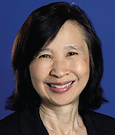The following essay by Grace Wang, MD, is adapted from The Big Casino: America’s Best Cancer Doctors Share Their Most Powerful Stories, which was coedited by Stan Winokur, MD, and Vincent Coppola and published in May 2014. The book is available on Amazon.com and thebigcasino.org.
D.K. came to me in 1997 with disseminated breast cancer. We talked about prognosis, and I told her that we’d never cured her disease. We discussed a clinical trial involving the experimental drug trastuzumab (Herceptin). She was a nurse and understood it was important for her to try the drug, not only for herself, but also for other patients.
“Dr. Wang! Your patient is having chills and shortness of breath,” said a nurse. It was DK. As I ran to the chemotherapy suite, I worried what could be happening. As physicians, our motto has always been, “First, do no harm.” Yet, when you have patients with diseases that are uniformly fatal, you become more interested in research trials. There aren’t other choices.
I began my career nearly 4 decades ago as an assistant professor at the University of Miami Medical School treating breast cancer patients. It was a time when many more of my patients presented with stage IV cancer. Thanks to breast cancer awareness and screening mammograms, many more patients are being cured today, and mortality rates have dropped 30%. However, one patient dying is one patient too many. When I came into private practice, I did clinical trials but not without some resistance.
At one point, we experimented with the natural (by this time, genetically cloned) immune system modulator interleukin. It was, among laymen anyway, the latest “magic bullet” for cancer. A reporter from the local newspaper interviewed my partner, Dr. Leonard Kalman, and me about the drug. I thought the interview had gone very well. Then to our dismay, we landed on the front page of the paper. We were compared to the Laetrile (a “wonder drug” supposedly distilled from apricot pits) clinic in Mexico that actor Steve McQueen went to for his cancer.
We were not under the umbrella of an academic institution, and, to be honest, interleukin had a lot of toxicity, including plummeting blood pressure, fever, and chills. It turned out that interleukin is now recognized as a drug that helps the immune system combat kidney cancer and melanoma. At the time, we hoped it would induce complete remissions and cure patients with other stage IV cancers. We proceeded with our trials. I became reporter-shy for many years.
Improving Breast Cancer Care
Let’s return to the story about DK, the nurse with breast cancer who’d been coming to our clinic for years. In my heart, she was not cured, but even though she had diffuse bone metastases, scan after scan showed she was in a complete remission. We finally stopped the trastuzumab in 2009. Today, DK is 75 and working as a hospice nurse. Trastuzumab was approved by the U.S. Food and Drug Administration in 1998, a landmark in the treatment of certain kinds of breast cancer.
I made the decision to leave my position at the University of Miami Medical School partly because I thought I would be bored treating only breast cancer patients. Now that the research is so voluminous and treatments are so targeted, I have come full circle. I’m never bored treating breast cancer patients, and I’m still doing clinical trials. Over my career, research has led to miracles. For example, thanks to the development of imatinib (Gleevec), we now see complete, long-term remissions in patients with chronic myeloid leukemia.
Everyone is becoming specialized, most often as part of a disease-oriented team. We now have breast surgeons, breast plastic surgeons, and medical and radiation oncologists, all focused on breast oncology. I go to breast cancer research conferences. The community physician is now part of research trials underway all over the world.
Medical ‘Miracles’
To me DK is one of those medical “miracles” that now occurs daily. When I reflect on my career, I remember other amazing patients like the one who went to dental school and had treatments for metastatic breast cancer that had spread to her bones. Today, she runs her own dental practice, her children are graduating from college, and she’s still in complete remission.
Another patient had 17 positive lymph nodes. She later adopted two babies, and she and her husband saw their children graduate from high school. She’s never had a relapse. And then there are the patients who develop new primary cancers that we pick up and are still cured because of good survivorship care.
When it comes to my patients and their prognoses, when I’m asked if there’s a cure for cancer, I’ve learned never to say never. ■
Dr. Wang is a medical oncologist specializing in hematology/oncology in Miami, Florida.


